What is a Hydraulic Torque Wrench?:
A Hydraulic Torque Wrench is a power tool that is used to torque or de-torque (simply tighten or loosen) bolts and studs.
This tool applies a controlled amount of torque to the fastener to ensure proper tightening without damaging the fastener or equipment.
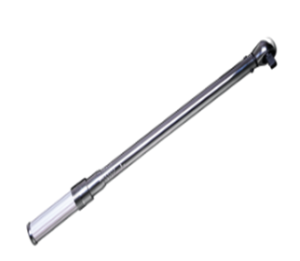
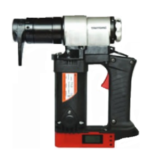
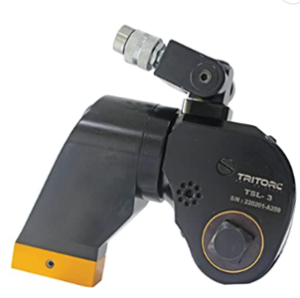
Each is progressively more powerful than the earlier one.
Working Principle:
Using Powerpacks that use either electricity or pneumatic hoses the prime mover runs a usually piston-based pump that pressurizes the Hydraulic Fluid.
- This fluid fills a cylinder to push a piston.
- The piston with it’s connecting rod is connected to a drive plate.
- The drive plate has an aperture that allows a Square Drive found on most common wrenches to fit.
- The square drive rotates a Socket attached to it, thus rotating the nut.
- This aperture can be used to accommodate the Nut directly as well.
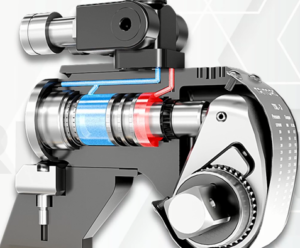
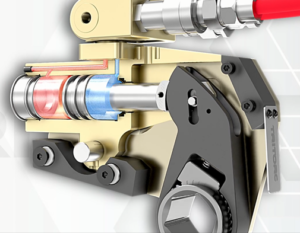
Types of Hydraulic Torque Wrench:
There are two main types of hydraulic torque wrenches: square drive and low profile.
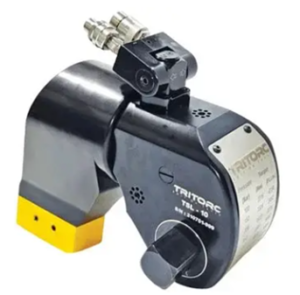
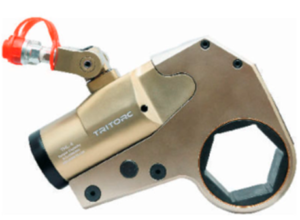
- Square drive hydraulic torque wrenches have a square drive that uses an Impact Socket that fits over the nut or bolt head, and they come in a range of sizes and torque capacities. They are commonly used in applications where high torque is required, such as in the oil and gas industry or heavy machinery maintenance.
- Low profile hydraulic torque wrenches are used in applications where access is limited, such as in confined spaces. They have a shorter profile and are available in a range of sizes and torque capacities.
Benefits of Hydraulic Torque Wrench:
- High Accuracy: Hydraulic torque wrenches provide high accuracy and precision, which is essential in industries where equipment and safety depend on the precise tightening of fasteners. To avoid crossing into the plastic deformation zone of a particular bolt, it is necessary to apply an optimum amount of torque.
- Speed: Hydraulic torque wrenches are faster than manual wrenches and save time, making them an ideal tool for large-scale industrial applications. This is especially true for larger-diameter bolts and studs in large quantities.
- Versatility: Hydraulic torque wrenches come in various sizes and torque capacities, making them versatile and adaptable to different applications.
- Consistency: Hydraulic torque wrenches provide consistent torque output, ensuring uniform tightening of fasteners.
- Safety: Hydraulic torque wrenches reduce the risk of accidents and injuries caused by improper tightening of fasteners.
Maintenance of Hydraulic Torque Wrench:
Proper maintenance of hydraulic torque wrenches is essential to ensure the tool’s longevity and reliability. Here are some maintenance tips:
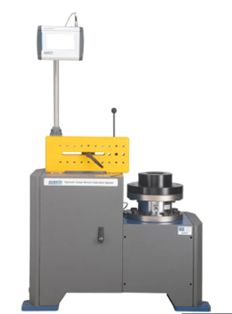
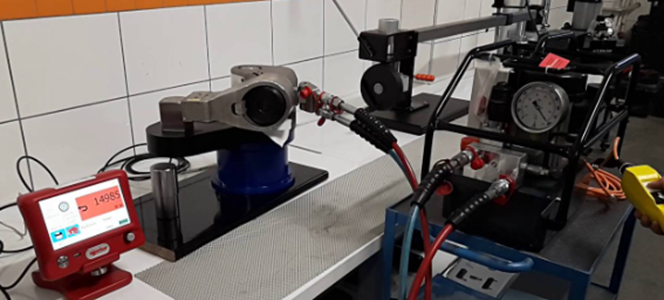
- Regular Inspection: Inspect the tool for any damage or leaks, and replace damaged parts immediately.
- Lubrication: Regularly lubricate the tool to prevent wear and tear, and ensure smooth operation.
- Cleaning: Clean the tool after each use to prevent debris from accumulating, which can cause damage or affect the tool’s performance.
- Calibration: Regularly calibrate the tool to ensure it is providing accurate torque output.
Safety Tips for Using Hydraulic Torque Wrench:
Hydraulic torque wrenches are powerful tools that can cause serious injuries if not used correctly. Here are some safety tips:
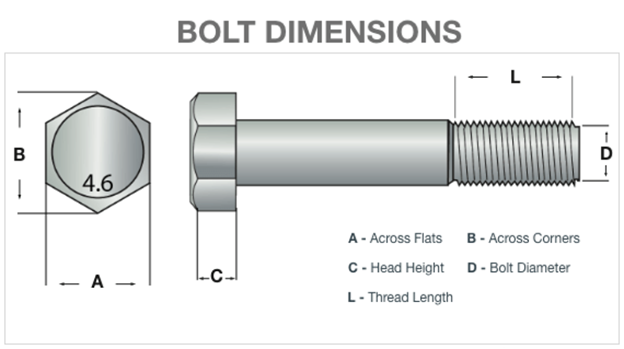

- Always use the correct size and capacity wrench for the job.
- Ensure the tool is calibrated and set to the correct torque specification for the fastener.
- Use proper personal protective equipment, such as safety glasses and gloves.
- Do not exceed the recommended torque capacity of the tool.
- Use proper technique when using the tool, and avoid sudden or jerky movements.
Applications of Hydraulic Torque Wrench:
Hydraulic torque wrenches are used in various industries and applications, including:
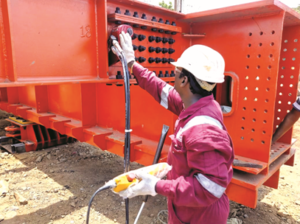
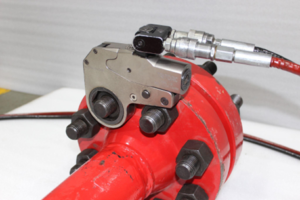
- Oil and Gas Industry: Applications here include maintenance and repair of pipelines, wellheads, and drilling equipment.
- Power Generation Industry: Applications here include maintenance and repair of turbines, generators, and other equipment.
- Manufacturing Industry: Applications include one in the manufacturing industry for assembly and maintenance of heavy machinery and equipment.
- Construction Industry: Usage includes the construction industry for assembly and maintenance of steel structures, bridges, and other infrastructure.
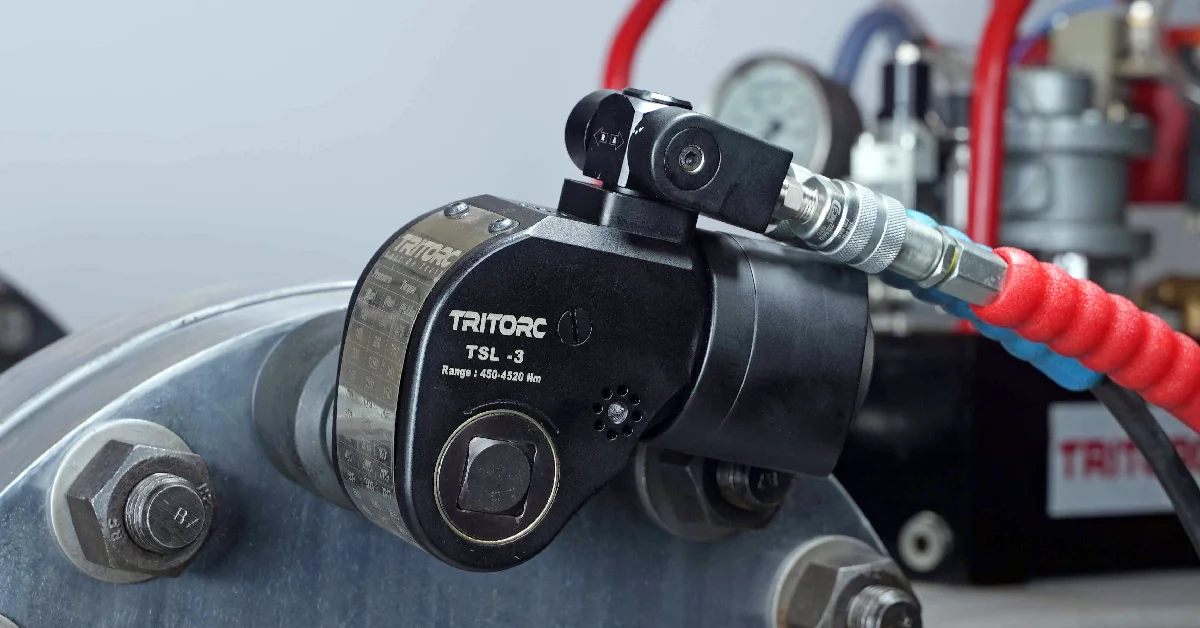
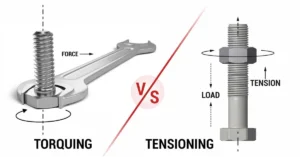
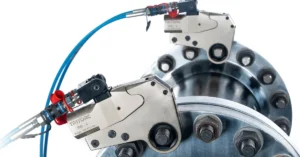
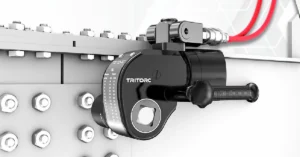

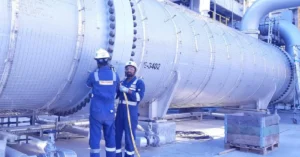
Leave a Reply